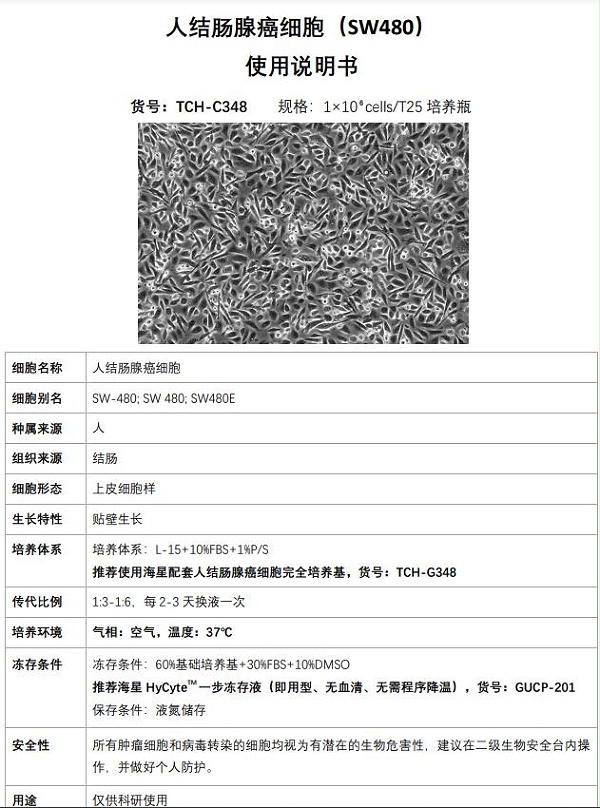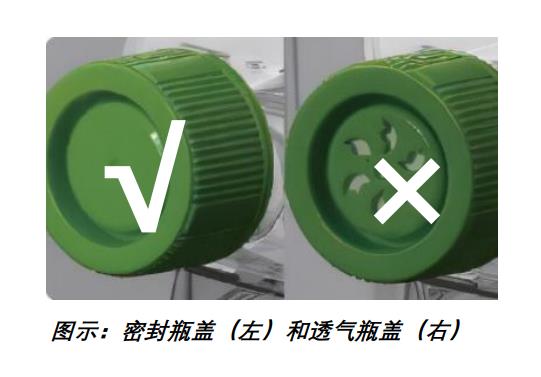

细胞名称: 人结肠腺癌细胞(STR鉴定正确)
细胞简称: SW480
细胞别称: SW-480; SW 480; SW480E;
sw480细胞货号:TCH-C348
规格: 1×10⁶cells/T25培养瓶
价格:1400元 (干冰运输需另加200元干冰费)
培养体系:L-15+10%FBS+1%P/S
配套培养基货号:TCH-G348
细胞名称: 人结肠腺癌细胞(STR鉴定正确)
细胞简称: SW480
细胞别称: SW-480; SW 480; SW480E;sw480细胞
货号:TCH-C348
规格: 1×10⁶cells/T25培养瓶
价格:1400元 (干冰运输需另加200元干冰费)
种属来源:人
组织来源:结肠
特征:结肠腺癌
细胞形态:上皮细胞样
生长特性:贴壁生长
培养体系:L-15+10%FBS+1%P/S
配套培养基货号:TCH-G348
传代比例:1:3-1:6,每2-3天换液一次
传代周期:48-72 h
培养条件:气相:空气,温度:37℃
冻存条件:60%基础培养基+30%FBS+10%DMSO,液氮储存
质量检测:细菌、真菌、支原体检测均为阴性

sw480细胞源自一位51岁白人男性的原位直肠腺癌,而SW620源自同一病人一年后的淋巴结转移灶。该细胞CSAp和直肠抗原3阴性;角蛋白阳性;p53基因第273位密码子的G→A突变引起Arg→His替代,309位密码子的C→T突变导致Pro→Ser替代;细胞p53蛋白表达水平升高;癌基因c-myc、K-ras、H-ras、N-ras、myb、sis和fos的表达呈阳性;未检测到癌基因N-myc的表达;不表达Matrilysin(一种与肿瘤侵袭相关的金属蛋白酶)。有报道称该细胞表达GM-CSF。
sw480细胞 L-15空气培养注意要点:
1. 空气培养注意要点:
a) 人结肠腺癌细胞(SW480)使用L15空气培养基。 L-15 采用磷酸盐和游离氨基酸而非碳酸氢钠进行缓冲。这种培养基适用 于支持非 CO2 平衡环境中的细胞生长。在使用该培养体系时,须将培养 箱的二氧化碳浓度调节至“0”(维持空气培养状态),如果通入5%二氧化 碳通过培养基对细胞产生毒性。
b) 如您没有无空气培养箱,可选择使用不透气培养瓶(密封瓶盖)培养该 细胞,并将瓶盖拧紧,每次操作时开盖短时间接触到的二氧化碳不影响该细胞正常培养。

图示:密封瓶盖培养瓶(左)和透气瓶盖培养瓶(右)
注意:可以选用 SW480细胞专用培养基(即用型培养基): 已添加血清和双抗等成分,可直接用于培养SW480细胞。
参考文献:
"Fogh J, et al. Absence of HeLa cell contamination in 169 cell lines derived from human tumors. J. Natl. Cancer Inst. 58: 209-214, 1977. PubMed: 833871
Goodfellow M, et al. One hundred and twenty-seven cultured human tumor cell lines producing tumors in nude mice. J. Natl. Cancer Inst. 59: 221-226, 1977. PubMed: 77210034
Lelbovitz A, et al. Detection and analysis of a glucose 6-phosphate dehydrogenase phenotype B cell line contamination. J. Natl. Cancer Inst. 63: 635-645, 1979. PubMed: 288927
Adachi A, et al. Productive, persistent infection of human colorectal cell lines with human immunodeficiency virus. J. Virol. 61: 209-213, 1987. PubMed: 3640832
Schroy PC, et al. Detection of p21ras mutations in colorectal adenomas and carcinomas by enzyme-linked immunosorbent assay. Cancer 76: 201-209, 1995. PubMed: 8625092
Trainer DL, et al. Biological characterization and oncogene expression in human colorectal carcinoma cell lines. Int. J. Cancer 41: 287-296, 1988. PubMed: 3338874
Weiss J, et al. Mutation and expression of the p53 gene in malignant melanoma cell lines. Int. J. Cancer 54: 693-699, 1993. PubMed: 8514460
Nigro JM, et al. Mutations in the p53 gene occur in diverse human tumour types. Nature 342: 705-707, 1989. PubMed: 2531845
Barnett SW, et al. Characterization of human immunodeficiency virus type 1 strains recovered from the bowel of infected individuals. Virology 182: 802-809, 1991. PubMed: 2024498
Leibovitz A, et al. Classification of human colorectal adenocarcinoma cell lines. Cancer Res. 36: 4562-4569, 1976. PubMed: 1000501
Geiser AG, et al. Suppression of tumorigenicity in human cell hybrids derived from cell lines expressing different activated ras oncogenes. Cancer Res. 49: 1572-1577, 1989. PubMed: 2647289
Lahm H, et al. Secretion of bioactive granulocyte-macrophage colony-stimulating factor by human colorectal carcinoma cells. Cancer Res. 54: 3700-3702, 1994. PubMed: 8033086
Rodrigues NR, et al. p53 mutations in colorectal cancer. Proc. Natl. Acad. Sci. USA 87: 7555-7559, 1990. PubMed: 1699228
Santoro IM, Groden J. Alternative splicing of the APC gene and its association with terminal differentiation. Cancer Res. 57: 488-494, 1997. PubMed: 9012479
Tsao H, et al. Novel mutations in the p16/CDKN2A binding region of the Cyclin-dependent Kinase-4 gene. Cancer Res. 58: 109-113, 1998. PubMed: 9426066
Zhu X, et al. Cell cycle-dependent modulation of telomerase activity in tumor cells. Proc. Natl. Acad. Sci. USA 93: 6091-6095, 1996. PubMed: 8650224
Witty JP, et al. Modulation of matrilysin levels in colon carcinoma cell lines affects tumorigenicity in vivo. Cancer Res. 54: 4805-4812, 1994. PubMed: 8062282"